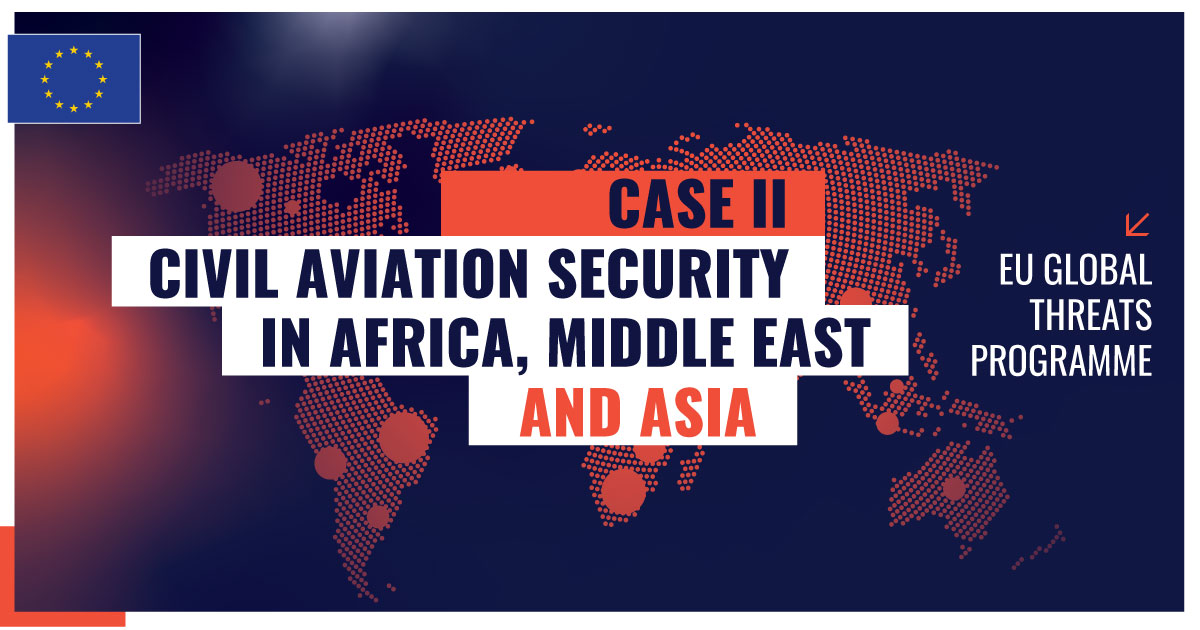
CONTEXT
Civil aviation security is an increasing concern as global air travel grows, affecting millions of passengers and facing evolving threats. Key risks include terrorist attacks with improvised explosive devices, hijackings, man portable air defence systems, and assaults on airport public areas.
The EU and international partners have reinforced security measures, aiming to exceed the minimum standards set by the International Civil Aviation Organization (ICAO), which remain the globally recognised baseline.
In the past decade, the EU has issued multiple regulations to strengthen aviation security within its borders, while recognising that it is a global challenge and that some countries lack the capacity to fully meet or exceed these standards. To address this, the CASE II project supports partner countries outside the EU in improving their aviation security frameworks, building on the results of CASE I and focusing on long-term sustainability through a risk-based approach.
OVERALL OBJECTIVE
This project aims to enhance the capacity of civil aviation security regimes in Partner States.
SPECIFIC OBJECTIVES
- To foster the effective and harmonised implementation of baseline security measures by States.
- To strengthen aviation security competences and practice in States beyond compliance with international standards.
- To develop a long-term relationship so as to deliver the two objectives and an effective, efficient and sustainable aviation security regime.
- To promote cooperation and facilitate network-building between States and security experts in the four regions (Africa, Asia, the Middle East, and Europe).
- To ensure planning and organisation of activities
CONCRETE ACTIVITIES
The project has delivered 248 capacity-building activities across the 3 regions, including but not limited to the following:
- training for National Auditors in Sri Lanka, Tajikistan, Cameroon, Comoros, Congo-Brazzaville, and Armenia.
- technical training on Security Equipment Inspection in the Maldives, Sierra Leone, and Albania.
- technical support to Ghana on a corrective action plan addressing ICAO recommendations.
- capacity building of Cameroon, Gambia, Kazakhstan, and Morocco by integration of their aviation security professionals in CASE II project team (as short-term secondees).
- training on landside security and threat detection in Kyrgyzstan (including landside security).
- specialised mentoring and coaching in key threat areas, e.g. explosive detection techniques in Pakistan and Kenya; counter-ManPADS (Man-Portable Air Defence Systems) measures, and quality control in Sri Lanka.
- thematic and strategic forums and workshops, e.g.: multilateral training on emerging threats in Eswatini; interregional seminar in Saudi Arabia on Aviation Security (AVSEC) privatisation and One-Stop Security; regional workshop on insider risk management for Civil Aviation Safety and Security Oversight Agency (CASSOA) Member States.
ACHIEVEMENTS
- Following the 2025 Universal Security Audit Programme Continuous Monitoring Approach (USAP-CMA) audit, which assesses the aviation security performance of its member states, Madagascar demonstrated significant improvements in its security frameworks since 2013, highlighting the country’s progress, attained with substantial support from the CASE II Project.
- The 2024 ICAO audit results in Kyrgyzstan improved after CASE II delivered activities, leading to better inspector qualifications and revisions to the national civil aviation security programme, training programme, quality control programme, risk assessment methodology, and equipment inspection requirements.
- Training activities in Tajikistan strengthened the national aviation security system, introduced a new risk assessment methodology, updated regulations and guidance, and improved security culture among operators and airport staff.
- In Kazakhstan, activities built strong risk assessment systems and oversight tools, amended multiple government decrees and ministerial orders, and increased readiness for the ICAO USAP CMA audit.
- In Comoros, a security risk assessment committee was created with stakeholders directly involved in risk assessment.
- Project duration
- 1 Dec 2019 - 1 Nov 2025
- Project locations
- AlgeriaAngolaArmeniaAzerbaijanBahrainBeninBotswanaBurkina FasoBurundiCabo VerdeCameroonCentral African RepublicChadComorosCongoCôte d’IvoireDjiboutiDemocratic Republic of the CongoEgyptEquatorial GuineaEritreaEswatiniEthiopiaGabonGeorgiaGhanaGuineaGuinea-BissauIndonesiaIraqJordanKazakhstanKenyaKuwaitKyrgyzstanLebanonLesothoLiberiaLibyaMadagascarMalawiMalaysiaMaldivesMaliMauritaniaMauritiusMoldovaMoroccoMozambiqueNamibiaNigeriaOmanPakistanQatarRwandaSão Tomé and PríncipeSaudi ArabiaSenegalSeychellesSierra LeoneSingaporeSomaliaSouth AfricaSouth SudanSri LankaSudanTajikistanTanzaniaThe GambiaTogoTunisiaTurkmenistanUgandaUkraineUnited Arab EmiratesUzbekistanVietnamYemenZambiaZimbabwe
- Overall budget
- €8 000 000
- Threat area
- Counter-Terrorism, Prevention of Violent Extremism
Results
- Partner States ensured effective implementation of baseline security measures with the implementation of international standards and best practices.
- Partner States gained a better understanding of priorities and challenges and cooperation between European States and Partner States is enhanced.
